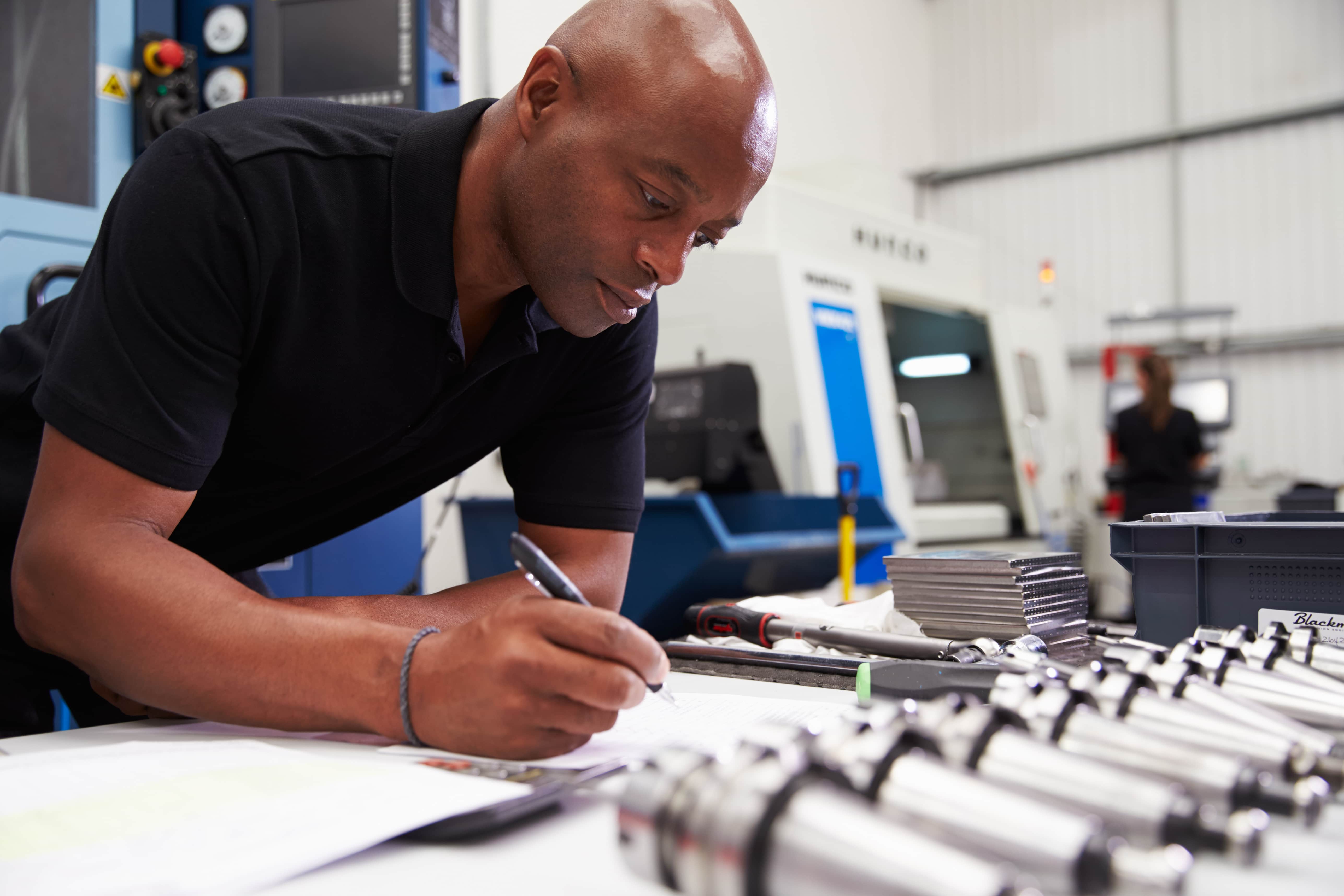
Many people are afraid that robots will one day take our jobs. This isn’t the case in the world of machining. All over the world, machinists are needed to set up, operate, repair the complex machines that help create the products we use every day. CNC Mill Machinists are one of these job markets that are growing thanks to robotic technology. This article will provide some insight into the day-to-day responsibilities of a CNC Mill Machinist, their compensation rates, along with how to find one of these amazing jobs. Enjoy!
What is a CNC Mill Machinist?
In the simplest terms, a CNC Mill Machinist works with CNC machinery that specializes in cutting materials into custom shapes. This job is responsible for setting up, programming, running and repairing the machine.
A machinist must know how the machine works from start to finish so that they may properly program the machine to create specific parts and how to quickly repair it if something goes wrong.
The milling machines used can cut many types of materials, including metal, plastic, wood and more. Since the machine is a computer numeric controlled (CNC) type, the machinist can easily program the machine to control the speed and precision depending on the material that is being cut.
There are also a ton of different types of CNC milling machines out there. Each one is designed to make different types of cuts or work with different materials. A machinist, in addition to everything else they are responsible for, also has to know how to handle each other kind of CNC machine.
One additional responsibility of a CNC Mill Machinist is quality control. As parts exit the machine, a machinist must ensure that these items are crafted to the exact specifications detailed on the blueprints. If they find something wrong, they need to adjust the machine accordingly. This part of the job requires that they know their way around precision measurement tools like calipers.
Given everything a CNC Mill Machinist does, you could say they are a crafter, mechanic, quality control and architect all built into one!
How much does a CNC Mill Machinist make?
CNC Machinist work is a very lucrative skilled trade. The national average in 2020 was about $19.00 per hour or about $41,000 a year. Again, this is the average and can fluctuate based on your location, experience and company. Some states, such as New York and Massachusetts, make about $22.00/hour on average. This works out to about $46,000 each year!
On the other hand, you may live in a state with lower average pay but more availability of CNC Machinist jobs. For example, Minnesota historically has many machinist jobs that need to be filled. With a market like that, you can shop around for the company that will give you the best pay, benefits or schedule that you desire.
Finally, pay isn’t just about how much money will show up on your paycheck. Your total compensation should also take benefits into account. While you may be making great money somewhere, if their medical benefits are sub-par, you may be spending your paycheck towards the healthcare you need. On the other hand, another company with slightly lower wages may have fantastic benefits and a 401k, ultimately helping you keep more of your paycheck for things you want to spend it on. These are all items you will want to consider when looking at jobs and potential salaries at each.
What is the difference between CNC machinist and CNC Operator?
More or less, a CNC Mill Machinist is going to have more experience and additional training under their belt versus a CNC Operator. While a CNC Mill Machinist has many of the same responsibilities as a CNC Operator, there are some key differences. When it comes to key responsibilities of both operators and machinists:
- Set-Up CNC Machinery
- Clean CNC Machinery
- Stock machine with necessary supplies
- Run CNC machine
- Calibrate machine as needed
Machinists often have these added responsibilities that come from years of experience and additional training:
- Troubleshooting CNC machinery issues
- Making necessary adjustments and repairs
- Supervising CNC Operators
- Understanding of material structures and properties
- Blueprint reading
- Quality Control of output
- Precision measurements of parts produced
So while you likely won’t be able to find an entry-level CNC machinist position, you can work into this great career through the CNC operator path. If you are already a CNC operator, you may want to read further to find out some ways to move into this next step of the job family.
What education do you need to become a machinist?
Becoming a mill machinist doesn’t require a special degree, but it certainly helps. With a high school diploma or GED, you can become an apprentice machinist. This will provide an on-the-job education that includes practical skills that you can see in action on the shop floor. This method of moving up in the CNC world is excellent because you can begin working in the field immediately. It is not desirable because it takes a lot longer to reach the top of the ladder this way.
An alternate option is going to a technical college or trade school. A school program will offer the training, and ultimately certification, you will need to start as a machinist. The classroom setting machinist training will, of course, help you understand the complexities of a CNC machine. This will include how to set up, run, and even program the machine. Additional education that a machinist program will provide is how to work with various materials such as wood, metal or plastics. Safety training, blueprint reading, and technical mathematics are also taught so graduates can comfortably navigate a machining shop.
This second option is more costly and will not give you nearly as much hands-on experience as an apprenticeship, but it can help you start in the field with higher pay or a better position since you have shown your aptitude for the job through your schooling.
Is a CNC Machinist job dangerous?
While a CNC Mill Machinist job certainly can be dangerous, it is very dependent on the shop’s commitment to safety. CNC machines are large, sometimes open, machines with moving parts like drills, saws or lathes. This means there are flying bits of metal, plastic or wood that could easily hit the machinist. Other CNC machines perform welds so there is a potential burn hazard. As well, a machining shop can be full of dust, debris, trip hazards and other dangers if not properly maintained.
If a machinist and their team are committed to wearing the proper personal protective equipment (PPE), keeping their work area clean, and practicing proper safety protocols, then the job can be fun, lucrative and safe.
Some PPE that machinists often wear are:
- Closed-toed or steel-toed shoes
- Safety glasses
- Dust masks (if working in a high dust environment)
- Work gloves
- Leather apron (to protect from oil and other debris on clothing)
- Hearing protection
Where do CNC Mill Machinists work?
CNC Mill Machinists primarily work for machining shops or manufacturing facilities. This is because a CNC machine is there to create or customize products. Mill machinists often work to produce metal or plastic parts associated with automotive or aerospace equipment. Factories and companies producing these types of products will generally need machinists somewhere in their supply chain.
CNC Mill Machinists are beginning to pop up in other industries as CNC machines become smaller, more affordable, and more complex. Factories aren’t the only ones in need of skilled machinists. Small businesses creating their own products or supplying larger companies are now in need of machinists to help them get the job done.
When do CNC Mill Machinists work?
Since machinist jobs primarily exist in a factory or production setting, the work schedule can vary. If you enter the field, you are likely to find the typical 1st, 2nd and 3rd shift offers along with the requirement of working overtime. This required overtime is due to sudden ramp-ups a company may have to adapt to. As the market calls for more cars, more car parts must be made, which means more machinists have to work.
This overtime isn’t an all the time thing, but it is highly likely you will be asked to stay a few more hours past your shift or come in on a weekend if you are in the industry. One positive thing to keep in mind here is that overtime, weekend shifts, or graveyard shifts often come with a pay differential. A pay differential is a boost in pay for the less desirable shifts that still need to be filled. You could be going home with a big fat check on these overtime-heavy weeks!
How do I find a CNC Mill Machinist job?
The skills of a CNC mill machinist are always in demand! Having someone who knows how to read a blueprint, set up and operate complex CNC machines, and meets production quotas is what every production company needs. Finding a job like this is simple, and you have a few options for going about it.
- Internet Job Hunt
Google is a miracle machine when it comes to looking for a job! You can type something simple like “CNC Mill Machinist Jobs Near Me” or something more specific like “CNC Mill Machinist Jobs 2nd Shift $20/hr,” and in both cases, you will get back tons of results. Use Google and the many job board websites to help you corral all the best jobs together.
- Staffing Agency
If you don’t have much experience under your belt, or you have particular needs in a job, such as health insurance, then you may want to check out your local staffing agency. This agency can help you find a job generally, but they can also help be your eyes and ears for the specifics you are looking for. Be sure to meet with your local recruiter so you can sit down and talk about your goals, expectations and job experience. This way, they have a full picture of what you have to offer.
- Direct Approach
You can just go straight to the source. If there is a company in town that is hiring for CNC machinist positions and you love their benefits and company culture, then just visit them directly. Some may ask that you fill out an application online, while others may be impressed if you introduce yourself in person.
No matter which option you choose when searching for your CNC machinist job, be sure to have your resume at the ready. Your resume should add any certifications or experience you have in the machining industry. You can also include your skills when it comes to mathematics, quality control, precision, safety and teamwork. These other skills will help employers know you are the full package they are looking for.











I am interested in working as an operator, do I have experience in software and computer mechanical maintenance where can I send my personal CV?
Hello Jose! Check out oninstaffing.com/locations to find the Ōnin Staffing branch closest to you. Our local team would love to reach out to you.
It made sense when you explained that the danger level of CNC is directly related to the machining shop’s commitment to safety. My brother wants to find a CNC machining service to create some custom parts for the new storefront he’s designing. Asking about safety practices should help him choose the right matching service, so thanks for giving me that idea to pass along to him!
No problem Rebecca! Thanks for taking the time to show your appreciation! We are always happy to help in any way we can!
Thanks for sharing such great content. After reading this article our doubts related to CNC machining are cleared.